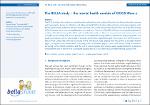The BELLA study – the mental health module of KIGGS Wave 2
Klasen, Fionna
Reiß, Franziska
Otto, Christiane
Haller, Anne-Catherine
Meyrose, Ann-Katrin
Barthel, Dana
Ravens-Sieberer, Ulrike
The BELLA study is the module on mental health and health-related quality of life within the German Health Interview and Examination Survey for Children and Adolescents (KiGGS). Baseline data collection took place together with KiGGS baseline data collection between 2003 and 2006. This article discusses the fourth follow-up of the BELLA study (BELLA Wave 4), which was surveyed between 2014 and 2017. The aims of the BELLA Wave 4 are to enable longitudinal analyses of health-related quality of life and mental health problems. Dynamic measurement instruments were used to enable a user-friendly and precise assessment of mental health among children, adolescents and young adults. The study’s participants were a sub-sample of around 3,500 KiGGS respondents aged 7 to 29 years. For the first time, in BELLA Wave 4 data were collected exclusively online. The BELLA study targeted both the parents of younger children (aged 7 to 13 years) and adolescents and young adults themselves (aged 11 years and above). Study instruments surveying mental health problems and the use of mental health care services were supplemented by a dynamic measurement tool in the form of a computer adaptive test (CAT) to record data on health-related quality of life.

